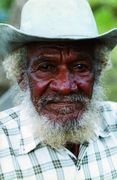Article published in the special Newsletter '15 years of PBI', October 2009
Luis Enrique Eguren (Spain), founding member of PBI Colombia
In 1993, several members of PBI conduct an exploratory mission and conclude that international accompaniment can make a positive contribution to the situation in Colombia.
It was a short call from Francesc, brimming over with excitement; something like «the funds are in place, we’re on the way: we’re going to Colombia». Several church-based aid agencies had joined together, at the initiative of Werner and PBI Germany, to cover the costs of the exploratory mission of PBI to Colombia. The objective? To evaluate whether or not the combined experience of PBI in Guatemala, El Salvador, Sri Lanka and other countries could be transferred to this context. We had received several written petitions in this respect, amongst others from the Justice and Peace Intercongregational Commission, as it was then known, the Association of Family Members of the Detained and Disappeared (ASFADDES) and Eduardo Umaña Mendoza1. From the outset, we saw that the gravity and complexity of the human rights situation in Colombia required a careful and reflective approach on our part, as there was little experience of international accompaniment in the country. To put it briefly, we needed to understand if the presence of international volunteers would be capable of protecting human rights defenders from threats and attacks and in what conditions or with what strategies that would be possible.
A few months later we arrived in Bogotá to begin what we had already guessed would be two intense months of interviews, reading and journeys: a steep learning curve in the broadest sense of the word. The team was composed of four people from different countries, all with experience in PBI: Francesc (Spain), Janey (USA), Marcela (Colombia) and Quique (Spain). We were warmly received by Justice and Peace, who made us a provisional space in their office, which we used as a base for our operations. They helped us with our initial contacts, which gradually developed into a wide and varied network. From Bogotá other visits were arranged to Barrancabermeja, Barranquilla, Meta and Sucre.
Looking back over these 16 years and at the conversations we had as a team, I believe for the four of us it was one of the most intense periods of our lives. We learnt about a beautiful and complex country immersed in different concurrent conflicts. We were immensely fortunate that hundreds of people agreed to share their analyses, opinions and direct experiences with us. These ranged from members of NGOs, communities and social organisations, to members of the government, security forces, embassy staff etc. I can also say that we laughed, cried and grew as individuals. Colombia lodged itself in our heads and our hearts.
Following the mission we spent several weeks producing a report that ended up totalling more than two hundred pages. We concluded that international accompaniment had a role to play in Colombia in certain scenarios and under certain conditions. Based on this report, PBI held a series of discussions that culminated in the decision to open a project in Colombia, after which the fundraising work began. The idea of accompaniment was well received by the aid agencies and we were soon able to open a small support office in London, train volunteers and carry out a lot of other work. In November we opened the first team in Bogotá, shortly followed by the opening of a team in Barrancabermeja. Of course we felt an enormous responsibility. Was our analysis correct that we could offer protection to human rights defenders? Would we be putting human rights defenders and volunteers at risk? Fortunately the passage of time, experience and all the support that we received from the beginning seem to answer these initial questions, as well as many others that have arisen since, in the constant challenge of international accompaniment in Colombia.
--
1 Eduardo Umaña Mendoza was a prestigious lawyer, responsible for very sensitive cases and especially those of the disappearances of the siege of the Palace of Justice and of the assassination of Jorge Eliécer Gaitán. Umaña Mendoza was assassinated in Bogotá on 18 April 1998.
--
Francesc Riera, founding member of PBI Colombia (Spain)
We had three very specific petitions: one from Padre Javier Giraldo to accompany and provide an international presence in the shelter of Justice and Peace for displaced persons in Barrancabermeja; another from CREDHOS to accompany them in Barrancabermeja, and finally one from ASFADDES to provide accompaniment in Bogotá.
In the report we established that there was no international presence nor had there ever been in the past. The presence of PBI would therefore be something completely new in Colombia and the need for international accompaniment was felt very keenly by human rights NGOs.
The initial assesment took place in May-June 1993 and the first team from PBI Colombia arrived in the country on 3 October 1994. We had the impression, later confirmed, that this was the PBI project that would receive most support from individuals, NGOs, institutions and embassies.

